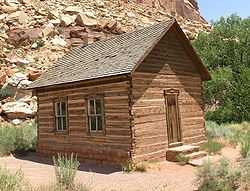Fruita, Utah
| Fruita | |
|---|---|
| Ghost town | |
 | |
 Fruita | |
| Coordinates: 38°17′08″N 111°14′39″W / 38.28556°N 111.24417°WCoordinates: 38°17′08″N 111°14′39″W / 38.28556°N 111.24417°W | |
| Country | United States |
| State | Utah |
| County | Wayne |
| Founded | 1880 |
| Abandoned | 1955 |
| Elevation[1] | 5,436 ft (1,657 m) |
| GNIS feature ID | 1441249[1] |
Fruita is the best-known settlement in Capitol Reef National Park in Wayne County, Utah, United States. It is located at the confluence of Fremont River and Sulphur Creek.
History
Fruita was established in 1880 by a group of Mormons led by Nels Johnson, under the name "Junction." The town became known as Fruita in 1902 or 1904. In 1900, Fruita was named The Eden of Wayne County for its large orchards. Fruita was abandoned in 1955 when the National Park Service purchased the town to be included in Capitol Reef National Park.
Today few buildings remain, except for the restored schoolhouse and the Gifford house and barn. The orchards remain, now under the ownership of the National Park Service, and have about 2,500 trees. The orchards are preserved by the NPS as a "historic landscape" and a small crew takes care of them by pruning, irrigating, replanting, and spraying them.
The one-room schoolhouse was built and opened in 1896. The few students were instructed mainly in reading, writing, and arithmetic, but when the teachers were capable, they also studied other subjects such as history or geography. The room was also used for balls and religious services. It was renovated in 1966 by the National Park Service.[2]
Fruita is currently the heart and administrative center of Capitol Reef National Park.
See also
Popular culture
- Used as the setting for Western Five Bloody Graves at the Internet Movie Database 1970, according to DVD audio commentary.
References
- ↑ 1.0 1.1 U.S. Geological Survey Geographic Names Information System: Fruita
- ↑ Fruita Schoolhouse PDF — National Register of Historic Places - Original Nominiation Form
External links
![]() Media related to Fruita, Utah at Wikimedia Commons
Media related to Fruita, Utah at Wikimedia Commons
| ||||||||||||||||||||
